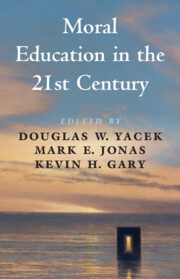Book contents
- Moral Education in the 21st Century
- Moral Education in the 21st Century
- Copyright page
- Contents
- Contributors
- Acknowledgments
- Chapter 1 Why Does Moral Education Matter in the 21st Century?
- Part I Historical Insights for Contemporary Moral Education
- Part II New Approaches to Moral Education
- Part III Responses to Contemporary Moral Problems
- Index
- References
Part I - Historical Insights for Contemporary Moral Education
Published online by Cambridge University Press: 01 June 2023
- Moral Education in the 21st Century
- Moral Education in the 21st Century
- Copyright page
- Contents
- Contributors
- Acknowledgments
- Chapter 1 Why Does Moral Education Matter in the 21st Century?
- Part I Historical Insights for Contemporary Moral Education
- Part II New Approaches to Moral Education
- Part III Responses to Contemporary Moral Problems
- Index
- References
Summary

- Type
- Chapter
- Information
- Moral Education in the 21st Century , pp. 7 - 112Publisher: Cambridge University PressPrint publication year: 2023

